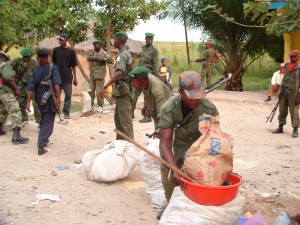Flumeya@gmail.com
People in the West of the Congo are left with the
impression that ‘Relief and development aid comes as a reward to
those in Eastern Congo who took guns to kill and rape each other rather than to those
from West who refrained from such behavior?’
Relief aid in the Congo is unevenly distributed even though needs are
everywhere the same. Aid distribution is crisis-driven rather than
being guided by distribution based on needs. Aid agencies working
for decades in the West of the country were forced to move eastward,
thanks to the distribution patterns stimulated by the well known CNN-effect.
While the East of the country has and is still experiencing war and
rape, the West is experiencing destitution. Most Congolese think of
their socio-economic base line as the period between independence and
the Mobutu-instigated coup of November 1965 after which things went
from bad to worse. For a majority of Congolese people, life
conditions have deteriorated severely, well below the base line level
at the time of independence.
Most Congolese have shifted from an economic status which included
house and land ownership to owning nothing. At the national level,
the whole of Congolese society has moved from relative well-being to
destitution.
In 2006 the disintegration of the Congo as a state was at stake,
especially for those living in the North-Eastern of the country. This sense
of disintegration was not shared with people in the West of the
country where degrading economic destitution was widely evident.
Thanks to the liberalization of diamond extraction in the two Kasai
provinces and the illegal exploitation and sale of Angolan diamonds
by the people of Bandundu in most part, unplanned urbanization in the West of the
country is taking place thus increasing the pressure on an already
fragile environment.
Diamond traffickers use their monetary power to bribe public officers
in charge of land adjudication and allocation, buying and building
houses without giving any consideration to the resultant negative
effects on the environment. Heavy rains in these provinces have
exacerbated environment degradation now apparent in soil and
fertility erosion and in the loss of houses and lives. Health
problems among the general populace, but especially among children,
have increased precipitously.
In this context of general destitution, many crisis-affected communities have misconception about humanitarian aid. For some, humanitarian aid is perceived as the only source of hope, other perceived it as a curse other a blessing but never in any time it will replace any long term development.
But isn’t it that in crisis time what counts is not your deeds bus instead how people feel?
Maya Angelou once said that it’s not about what you say or do to
people that they will remember, but it is instead about how you make
people feel.
Fidele Ayu Lumeya
Executive Director Congolese American Council for Peace and Development,CACPD. Congoamerican@yahoo.org www.CACPDUSA.org “No Development without Peace and Justice”

